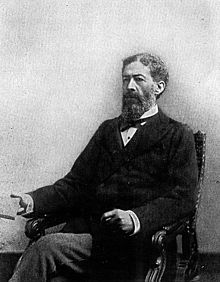John Mercer Langston
| John Mercer Langston | |
|---|---|
 |
|
| Member of the U.S. House of Representatives from Virginia's 4th district |
|
|
In office September 23, 1890 – March 3, 1891 |
|
| Preceded by | Edward Carrington Venable |
| Succeeded by | James F. Epes |
| Personal details | |
| Born |
December 14, 1829 Louisa County, Virginia |
| Died | November 15, 1897 (aged 67) Washington, D.C. |
| Political party | Republican |
| Spouse(s) | Caroline Matilda Wall |
| Alma mater | Oberlin College (B.A., M.A.) |
| Profession | lawyer, politician, academic |
John Mercer Langston (December 14, 1829 – November 15, 1897) was an American abolitionist, attorney, educator, activist, diplomat, and politician. He was the first dean of the law school at Howard University and helped create the department. He was the first president of what is now Virginia State University, a historically black college.
Born a free black in Virginia to a freedwoman of mixed race and a white planter father, in 1888 Langston was elected to the U.S. Congress as the first representative of color from Virginia. Joseph Hayne Rainey, the black Republican congressman from South Carolina, had been elected in 1870 during the Reconstruction era.
In the Jim Crow era of the later nineteenth century, Langston was one of only five African Americans elected to Congress from the South before the former Confederate states passed constitutions and electoral rules from 1890 to 1908 that essentially disenfranchised most blacks and many poor whites, excluding the blacks from politics. After that, no African Americans would be elected from the South until 1973, after the federal Voting Rights Act of 1965 was passed to enforce their constitutional rights. In addition, the U.S. Supreme Court struck down the gerrymandered district lines that southern white Democratic State legislatures had drawn to dilute their power and prevent blacks from having enough of a presence in any district to be able to elect a representative of their choice. At the time, most blacks supported Republican Party candidates, both white and black.
...
Wikipedia
